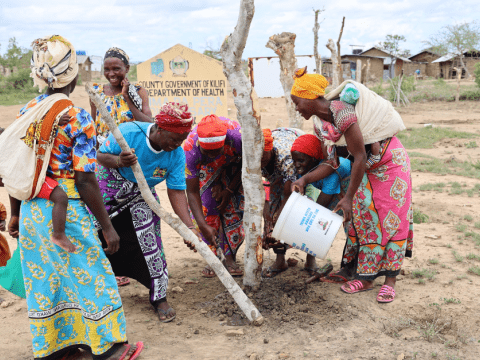Women Groups in Rural Villages of Kilifi County Saving for the Future

Farida Kalu, a 28-year-old mother of four, lives in Bamba, Kilifi County, Kenya. She depends on farming to support her family's needs. However, farming in her area, which is among arid and semi-arid lands (ASALs), is highly unpredictable due to unreliable rainfall patterns and severe droughts. The prolonged droughts resulting in crop failure affects the community, making them food insecure and posing a direct threat to the nutrition of children and families.
Farida felt discouraged due to the drought, and the economic crisis of the last decade and its consequences, particularly the high inflation rates, which had further deteriorated her family's quality of life. She shares, "Farming is no longer viable in this area due to the persistent drought situation. We have been experiencing total crop failures and livestock deaths, leading to severe food shortages. The cost of living has also risen, making life more challenging for us." The scarcity of resources prevented her from keeping her children in school, as they were occasionally sent home for school levies.
World Vision, through the Mother to Mother Project funded by SHIONOGI, introduced the Savings For Transformation (S4T) model in her Community. Farida is among 540 women in Ganze, Kilifi County who were identified, enrolled and have actively participated in the S4T group under the Mother to Mother project. Alongside 18 other women, they have established the Afya Yetu Jukumu Letu S4T Group, with a vision of uplifting the most disadvantaged and vulnerable members of society.

Farida expounds, "We have managed to save money collectively, though in small amounts. Today, we can lend to each other when needs arise, such as children's education, a family member's illness, and income reduction due to droughts. This group has strengthened our unity, and we are now actively encouraging each other."
She has utilised a portion of the funds she borrowed from her S4T group to acquire a sewing machine. Farida is happy because her tailoring business has garnered numerous clients, allowing her to comfortably cover school fees for her children and address other family needs.

She has also planted eggplant, locally known as “Biringanya” and pawpaw fruits in her farm which ensures her children have a balanced diet, protecting them from malnutrition.

World Vision Kenya worked closely with the community to Strengthen Baby friendly community initiative in order to improve Maternal New born Child Health service utilisation for 54 Mother to Mother support groups in Midoina, Rimarapera, Marere and Goshi in Kilifi County.
Today, Farida has become a lead mentor in her group. She reports, “During our group meetings, I have been sensitising women, including pregnant and lactating mothers on Baby-Friendly Initiatives.” She happily notes that women in her community have embraced the teachings and are now championing good hygiene practices to protect their children, while also saving for the future.

The project has donated 350 Galla goats to 33 support groups in the area. Galla goats are well adapted to the harsh conditions of the Arid and Semi-Arid Lands. This heat-tolerant breed mature faster and give birth twice a year, thereby generating quicker income and improving the livelihoods of the households. The project has also contributed improved local poultry to 540 mothers and provided assorted vegetable and green gram seeds to 33 Mother-to-Mother groups.

Margaret Waka, World Vision Project Officer based in Bamba Area Program (AP) reports, “All these life-saving efforts are aimed at strengthening community-level structures to sustainably deliver Maternal New born Child Health services at household level.”
She further notes, “I have witnessed firsthand how saving groups can be a driving force for changing people’s lives. The S4T model has been a game-changer in building resilience for vulnerable families.”
By Felix Pilipili, Communications Specialist, World Vision Kenya